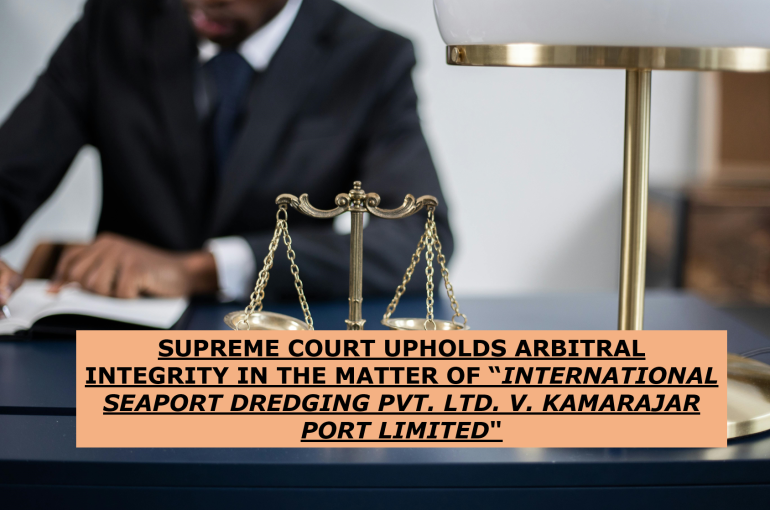SUPREME COURT UPHOLDS ARBITRAL INTEGRITY IN THE MATTER OF “INTERNATIONAL SEAPORT DREDGING PVT. LTD. V. KAMARAJAR PORT LIMITED”
Introduction
The Hon’ble Supreme Court of India, in its judgment dated 24.10.2024, in the case of International Seaport Dredging Pvt. Ltd. v. Kamarajar Port Limited, delivered through a bench comprising Dr. D.Y. Chandrachud, C.J., J.B. Pardiwala, and Manoj Misra, JJ., addressed critical issues concerning the enforcement of arbitral awards under the Arbitration and Conciliation Act, 1996. The case revolved around the conditions for granting a stay on the execution of an arbitral award and the equal treatment of public and private entities in arbitration proceedings.
Factual Background
The case arises from a dispute between International Seaport Dredging Pvt. Ltd. (Appellant) and Kamarajar Port Limited (Respondent) over a contractual agreement for Phase-III capital dredging at Kamarajar Port. The Respondent issued a Letter of Award for the project valued at approximately ₹274 crores, and a contract was formalized on 12.08.2015. The project scope included dredging container berths, coal berths, debris removal, and environmental monitoring. The completion date was set as 11.04.2017.
Subsequent disagreements arose during the execution of the contract, prompting the Appellant to invoke the arbitration clause in the agreement. The arbitral proceedings culminated in an award dated 07.03.2024. The arbitral tribunal directed the Respondent to pay the Appellant a sum of ₹21.07 crores, along with interest at 9% per annum from 15.11.2017, until the date of the award. If payment was delayed beyond three months, the interest rate was to increase to 12% per annum. Additionally, the tribunal awarded ₹3.21 crores as costs to the Appellant.
Both parties filed applications under Section 33 of the Arbitration and Conciliation Act, 1996, seeking modifications to the award. While the tribunal dismissed the Respondent’s application, it partially allowed the Appellant’s request, increasing the awarded costs by ₹12 lakhs to reflect the arbitral tribunal’s fees.
Proceedings Before the High Court
The Respondent challenged the arbitral award under Section 34 of the Arbitration and Conciliation Act, 1996, and sought a stay on its enforcement. On 09.09.2024, the High Court of Madras granted a stay of the award’s execution but imposed certain conditions.
The High Court directed the Respondent to furnish a bank guarantee for the principal amount of ₹21.07 crores within eight weeks. However, the stay excluded payment of the interest and costs awarded to the Appellant. This decision was justified on the grounds that the Respondent was a statutory authority and not a “fly-by-night operator,” a factor that influenced the Court’s determination of conditions for granting the stay.
Issues Before the Supreme Court
- Whether the High Court was justified in directing the Respondent to furnish only a bank guarantee rather than deposit the awarded amount as a condition for stay.
- Whether the Respondent’s status as a statutory body could be considered in determining the conditions for granting a stay.
Supreme Court’s Analysis
The Supreme Court examined the matter in light of Section 36 of the Arbitration and Conciliation Act, which governs the enforceability of arbitral awards. Under Section 36(2), an arbitral award is not automatically unenforceable when a challenge is filed under Section 34. Instead, a stay may be granted under Section 36(3), subject to conditions deemed appropriate by the Court.
The Court noted that the High Court relied heavily on the Respondent’s status as a statutory body to justify the furnishing of a bank guarantee and the exclusion of interest and costs from the stay conditions. This approach, according to the Supreme Court, was flawed. Arbitration proceedings are governed by principles of equality, as enshrined in Section 18 of the Arbitration Act. The Act does not differentiate between government entities and private parties, and the High Court’s reliance on subjective considerations such as the Respondent’s reliability as a statutory body was misplaced.
Further, the Supreme Court observed that the High Court addressed only one aspect of the award—a claim related to the refund of cess under the Building and Other Construction Workers’ Welfare Cess Act, 1996—and ignored other claims amounting to approximately ₹18 crores. This selective consideration undermined the arbitral tribunal’s decision and failed to account for the comprehensive nature of the award.
Key Legal Principles
The Supreme Court held that government entities are not entitled to special treatment in arbitration proceedings. Stay conditions must align with the principles of fairness and the provisions of the Arbitration Act, and any reference to the CPC is merely directory.
It was emphasized that discretion in granting stays should not be influenced by the identity of the parties or the size of the awarded amount, even when public corporations are involved.
The Court also highlighted that the Arbitration Act operates as a self-contained code, designed to provide a swift and fair resolution of disputes. The intent of the Act would be defeated if arbitral awards could be stayed without stringent conditions, especially when they function as money decrees.
Supreme Court’s Decision
The Supreme Court held that the High Court erred in granting a stay based solely on the Respondent’s status as a statutory body. The law does not distinguish between private and public entities in arbitration proceedings, and such differentiation is contrary to the principles of equality under the Act.
The Court modified the High Court’s order, directing the Respondent to:
- Deposit 75% of the awarded amount (inclusive of interest) with the High Court by November 30, 2024.
- A stay on the enforcement of the arbitral award was conditional on the deposit of this amount.
The Supreme Court allowed the appeal, emphasizing that arbitral awards must be treated with the same finality and enforceability as judicial decrees, irrespective of the parties involved.
ASHITA
ASSOCIATE
THE INDIAN LAWYER & ALLIED SERVICES





































Leave a Reply